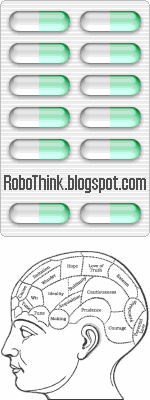Prozac In Our Drinking Water
According to a 2004 article on the BBC website Prozac is consumed so ubiquitously in the United Kingdom that it has been detected in rivers and groundwater supplies. I wonder if other countries have performed the same tests with similar results. I'm assuming users have an internal surplus of the drug - beyond that which gets bound to serotonin re-uptake receptors - and it leaks out in the user's urine and gets recycled at sewage treatment stations. Prozac was launched in 1987. Before Prozac, between 5-10% of the British adult population was addicted to Valium (Diazepam) according to newspaper reports. In 1966, the Rolling Stones wrote a song about those little yellow pills: Mother's Little Helper (lyrics).
If you're reading about Prozac because you're feeling blue, this parody feature in Happy Woman magazine may bring a knowing smile to your face: How Prozac saved my marriage.
If you're reading about Prozac because you're feeling blue, this parody feature in Happy Woman magazine may bring a knowing smile to your face: How Prozac saved my marriage.
 In the 19th century, the eminent biologist Thomas Huxley, F.R.S., was known as "Darwin's Bulldog" for his defense of Charles Darwin's theory of evolution. He was the founder of a distinguished family tree, including grandsons Aldous Huxley (the writer), Sir Julian Huxley (the first Director General of UNESCO and founder of the World Wildlife Fund), and Sir Andrew Huxley (physiologist and Nobel laureate).
In the 19th century, the eminent biologist Thomas Huxley, F.R.S., was known as "Darwin's Bulldog" for his defense of Charles Darwin's theory of evolution. He was the founder of a distinguished family tree, including grandsons Aldous Huxley (the writer), Sir Julian Huxley (the first Director General of UNESCO and founder of the World Wildlife Fund), and Sir Andrew Huxley (physiologist and Nobel laureate). 